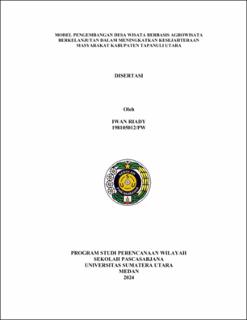| dc.description.abstract | community welfare, incorporating sustainable agrotourism as a moderating variable.
Agrotourism is a promising sector in North Tapanuli, where many tourism villages have
been developed to leverage the region's agricultural-based geographical advantages.
Sustainable agrotourism is expected to address the negative impacts that may arise
between the agricultural and tourism sectors, as well as to optimize tourism village
development to enhance community welfare. The analysis uses both quantitative and
qualitative methods, with hypothesis testing as the primary approach. The results indicate
that, overall, the tourism village development model significantly influences community
welfare. However, on a partial basis, community participation does not significantly
impact community welfare, suggesting that not all aspects of tourism village development
have a uniform effect. Furthermore, the overall tourism village development model has a
significant effect on sustainable agrotourism. In contrast, community participation and
rural tourism products individually do not have a significant impact on tourism village
development, highlighting variations in the influence of tourism village development on
sustainable agrotourism. Sustainable agrotourism has a proven significant effect on
community welfare, although safety considerations show no significant influence. This
emphasizes the importance of including a broader range of variables in assessing the
impact of sustainable agrotourism. Additionally, overall tourism village development has
a significant effect on community welfare through sustainable agrotourism. However,
community participation and rural tourism products do not make a significant direct
contribution to community welfare via sustainable agrotourism. A novel finding from this
study is the tourism village development model that emphasizes sustainable agrotourism
as a primary driver in achieving community welfare. The implications of these findings
may provide new directions for sustainable tourism village development by holistically
considering the interactions between various aspects in the context of tourism village and
sustainable agrotourism development. | en_US |


